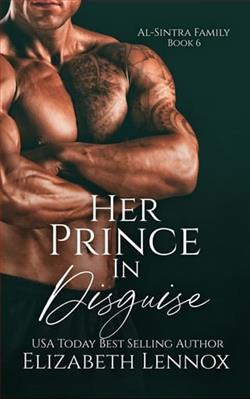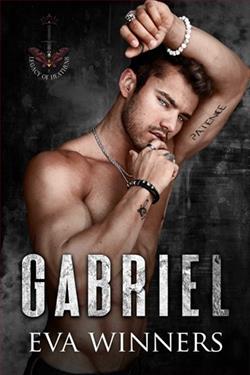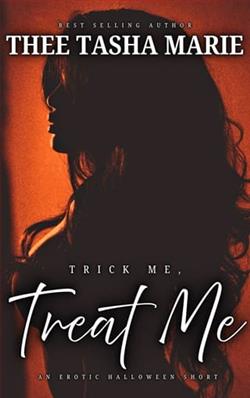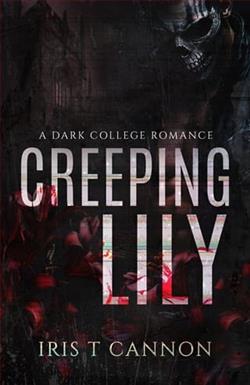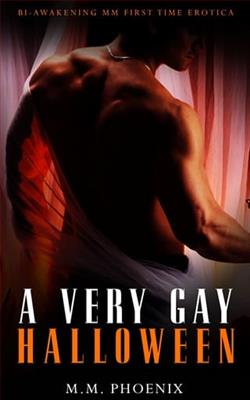Page 12 of Matches and Mistletoe
“Because it ensures that your words in my presence will always be guarded and guided by your love for me.”
What could I do but agree? It seemed a small thing, the elimination of a single word in exchange for a lifetime of happiness. So I vowed, and Ernestine kissed me deeply. As we kissed, a magnificent pine tree burst from the cold earth, growing to a height that nearly matched that of the church, and on its branches appeared rich gifts of all kinds—bracelets and baubles, warm coats and fluffy blankets, long scarves and colored ribbons. The faeries snatched the gifts and gave them to my people, who accepted with joy and gratitude.
“Thank you,” I told Ernestine. “Your heart is as beautiful as your sweet face.” And I kissed her again.
“As long as we are bound in this marriage, you will not age,” she told me, stroking the hair along my temple. “You and I can be happy forever.”
And we were happy, for a hundred long years—irrepressibly happy. We were kind lords to the Fae folk and the humans of the land, and though we were not graced with children, we treated every Fae or human child like our own, showering them with gifts and kindness. Every year we hung magical presents upon the great tree in the village, and every year faeries and humans danced together on Christmas Eve.
But as generations came and went, the humans began to whisper about my wife and I. They claimed I was some unnatural creature, drinking blood to ensure my agelessness. The Fae folk slowly disappeared from the forests, driven out by the increasing hostility of the humans.
Ernestine began to wander in the woods, going farther and farther afield, sometimes disappearing for days on end. Her wanderings pained me, though I knew she was a wild creature that I could not tame—nor would I wish to confine her. But I missed her with all my heart.
One day she returned after a week-long absence, and when she slipped into our room I glared at her. “Where have you been?”
“Communing with the trees and caring for the rivers.” Her blue eyes drooped with sadness, and her skin shone paler than ever.
“You should take better care of yourself. You look like death.”
I did not mean to say it. Truly.
But Ernestine’s eyes went wild, and she screamed—a terrible, throat-ripping shriek. She raced from our chambers out into the snow. I ran after her, but I lost her in the forest, amid the dark barren trees.
She did not return at Christmas, though I climbed the great tree myself and hung gifts and lanterns from its boughs, hoping the light and joy of the season would bring her back to me; but she did not come.
Another year passed, and another. On the fourth Christmas Eve since her disappearance, I lit the tree once more, but I was careless in my grief, and the boughs caught fire. The people considered it a foul omen and drove me from my castle. I was fortunate to escape with my life, and with one charred remnant of the great Christmas tree.
That night I wandered back to the hot spring where I had first met Ernestine, but it was frozen over. In the plane of ice I glimpsed my reflection, and the newly grayed hairs at my temples. My bond with Ernestine was broken, and I had begun to age.
Half-mad with grief, I took the shard of wood from my pocket and struck it against the frozen pool—struck again, and again, until the ice cracked and split apart. I wrenched out the slabs of broken ice with bruised blue fingers. Shaking with cold, I stripped naked and climbed into the pool, immersing myself up to my neck.
“Ernestine,” I whispered. “Accept my love, my regret, and my death.”
I closed my eyes, and I waited to die.
A soft surge of warmth spread through my toes, seeping upward along my limbs. I opened my eyes and saw the pool glowing golden, as if there was a blazing sun in its depths. When five small fingers grazed my chest, I caught that familiar hand by the wrist and drew Ernestine up from the pool, and I clasped her to me in an agony of delight.
We let our bodies speak for us, a desperate dance of limbs and kisses and desire. The freezing hour of midnight could not touch us, for we lay wrapped in the warm embrace of the water.
“You cannot be immortal again,” whispered Ernestine. “I am sorry, my love. It was a spell I can only use once, and there is no other magic to give you the life span of a faerie.”
“It was my wrongdoing, and I will accept the punishment.” I kissed her forehead. “All I crave is to be near you, for as long as you will allow it. We can build a cabin and live quietly, in bliss and in solitude. It is all I’ve ever wanted.”
“And so we shall,” she answered. “I will not leave you until the end of your days.”
After a time we left the pool, and Ernestine conjured warm clothes for us. We walked together to the hill near the village, to see the dawn of Christmas Day shining in rosy gold along the horizon.
Through the window of a farmhouse nearby I noticed a sparkle of candlelight, and the brush of dark green branches. Tugging Ernestine with me, I drew closer, and through the frosted panes I saw a small fir, bedecked with lights and ribbons and sparkly baubles.
A young boy came out of the house with a milk pail and stared at us. He was too young to recognize me, as I had been reclusive since Ernestine’s departure.
“A good morning to you, lad,” I said. “Tell me, what is that tree in your house?”
“It’s a Christmas tree,” he replied. “The big one in the town square burned, so each family fetched their own little one. Saints bless you, sir!” And he bounded away toward the stables.
Ernestine’s hand tightened around mine, and we turned to each other with smiles as bright as the Christmas morning.
3








